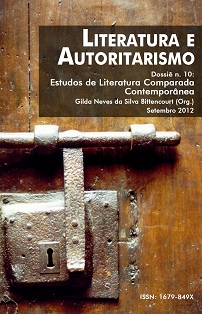Ficção brasileira censurada nos anos 70
DOI:
https://doi.org/10.5902/1679849X75396Palavras-chave:
Literatura brasileira, Censura, Ignacio de Loyola Brandão, Érico VeríssimoResumo
A censura intensificou-se no Brasil particularmente entre 1969 e 1978, período de vigência do AI-5. Enquanto a imprensa periódica era submetida à censura prévia, os livros eram alcançados pela censura com base em denúncias e podiam ser condenados, pela aposição de rótulos como “subversivos” ou “atentatórios à moral e aos bons costumes”. Após a condenação, podiam ser vetados para comercialização, apreendidos ou destruídos. A ausência de critérios por parte dos censores acarretou intranqüilidade, desorientação e até autocensura por parte dos escritores. Não faltou, entretanto, quem se expusesse, empregando expressões transgressoras, trazendo à tona a violência e a deterioração das relações humanas e sociais. Uma maneira de contornar o problema, conforme já observaram historiadores e críticos, consistiu na criação de narradores irônicos, responsáveis por textos satíricos ou alegóricos. Dentre esses, destaca-se Zero, de Ignacio de Loyola Brandão, ou “Rebelião dos mortos”, premiado conto de Luiz Fernando Emediato. A ênfase ideológica presente nessas narrativas fatalmente atrairia as denúncias que resultaram, de fato, em sua proibição. Por outro lado, a publicação de Incidente em Antares (1973), de Érico Veríssimo, demonstra que a narrativa alegórica podia alcançar o grande público sem sofrer nenhum cerceamento por parte da censura, possivelmente graças ao renome do autor. Levando em conta que em tais obras sobressaem componentes temáticos relacionados à denúncia e contestação, o presente estudo discute os recursos estilísticos a que os escritores recorreram para distanciar-se da camada denotativa e do mero realismo descritivo ou panfletário, ampliando consideravelmente o leque de leituras para esses textos.
Downloads
Referências
ARRIGUCCI JR, Davi. Outros achados e perdidos. São Paulo: Companhia das mLetras, 1999.
BARBIERI, Therezinha. Ficção impura. Prosa brasileira dos anos 70, 80 e 90. Rio de Janeiro: Ed. UERJ, 2003.
BRANDÃO, Ignacio de Loyola. Zero. São Paulo: Global, 2001.
CADERNOS de Literatura Brasileira. Ignacio de Loyola Brandão. No. 11 – junho de 2001. Rio de Janeiro: Instituto Moreira Salles.
CHAVES, Flávio Loureiro. Érico Veríssimo – o escritor e seu tempo. Porto Alegre: Ed. da Universidade; UFRGS, 2001.
EMEDIATO, Luiz Fernando. “Rebelião dos mortos” in Trevas no paraíso. Histórias de amor e guerra nos anos de chumbo. São Paulo: Geração Editorial, 2004.
FRANCO, Renato. Itinerário político do romance pós-64: A festa. São Paulo: Ed. da Unesp, 1998.
GASPARI, Elio. A ditadura derrotada. São Paulo: Companhia das Letras, 2003.
GASPARI, Elio. A ditadura envergonhada. São Paulo: Companhia das Letras, 2002 (a).
GASPARI, Elio. A ditadura escancarada. São Paulo: Companhia das Letras, 2002 (b).
OTSUKA, Edu Teruki. Marcas da catástrofe. Experiência urbana e indústria cultural em Rubem Fonseca, João Gilberto Noll e Chico Buarque. São Paulo: Nankin, 2001.
PELLEGRINI, Tânia. A imagem e a letra. Aspectos da ficção brasileira contemporânea. São Paulo: Mercado das Letras; Fapesp, 1999.
RUFFATO, Luiz. “Por que ler Emediato hoje?” in EMEDIATO, L. F. Trevas no paraíso. Histórias de amor e guerra nos anos de chumbo. São Paulo: Geração Editorial, 2004.
SCHWARZ, Roberto. Seqüências brasileiras. São Paulo: Companhia das Letras, 1999.
SILVERMAN, Malcolm. Protesto e o novo romance brasileiro. Rio de Janeiro: Civilização Brasileira, 2000.
SÜSSEKIND, Flora. Literatura e vida literária. Polêmicas, diários & retratos. Belo Horizonte: Ed. UFMG, 2004.
VERÍSSIMO, Érico. Incidente em Antares. Porto Alegre: Globo, 1985.
Downloads
Publicado
Como Citar
Edição
Seção
Licença
DECLARAÇÃO DE ORIGINALIDADE E EXCLUSIVIDADE E CESSÃO DE DIREITOS AUTORAIS
Declaro que o presente artigo é original e não foi submetido à publicação em qualquer outro periódico nacional ou internacional, quer seja em parte ou na íntegra. Declaro, ainda, que após publicado pela Literatura e Autoritarismo, ele jamais será submetido a outro periódico. Também tenho ciência que a submissão dos originais à Literatura e Autoritarismo implica transferência dos direitos autorais da publicação digital. A não observância desse compromisso submeterá o infrator a sanções e penas previstas na Lei de Proteção de Direitos Autorais (nº 9610, de 19/02/98).






